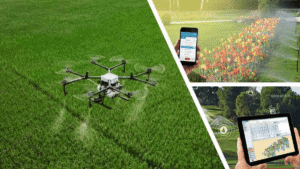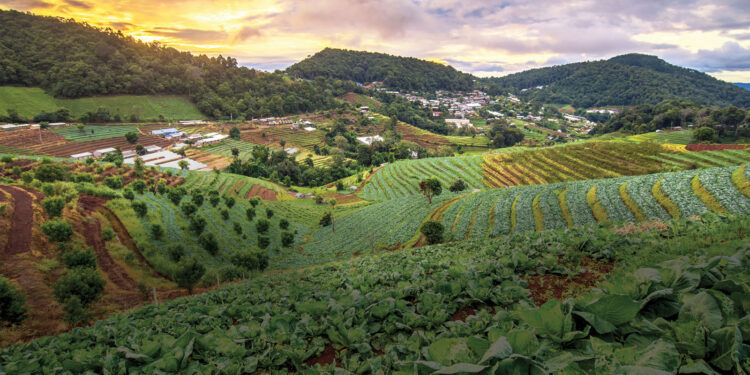This article will discuss the impact of technology on crop yields and food security in the agriculture industry. It will examine the ways in which technology has revolutionized farming practices, and the benefits it brings to both farmers and consumers.
The article will explore various technological advances in the agriculture industry, including precision agriculture, drones, biotechnology, and machine learning, and how these tools are used to increase crop yields and improve food security.
Agriculture has come a long way since the first humans began farming crops thousands of years ago. Today, technology is playing an increasingly important role in the agriculture industry, revolutionizing the way crops are grown and harvested.
The use of technology in agriculture is not only improving efficiency and productivity but also contributing to global food security. In this article, we will explore the impact of technology on crop yields and food security, and how these advances are changing the way we think about farming.
Precision Agriculture

One of the most significant advances in agriculture technology is precision agriculture. Precision agriculture uses a combination of sensors, GPS, and machine learning algorithms to optimize farming practices.
By analyzing data from sensors and other sources, farmers can adjust irrigation and fertilizer application rates, seed density, and other parameters to maximize crop yields. Precision agriculture has been shown to increase yields while reducing the use of resources, such as water and fertilizer, ultimately leading to more efficient and sustainable agriculture.
Drones
Another technological advance that is revolutionizing the agriculture industry is the use of drones. Drones are used for a variety of purposes in agriculture, from mapping fields to monitoring crop growth and health.
Drones equipped with sensors and cameras can collect data on plant height, growth rates, and other indicators, providing farmers with valuable insights into the health and development of their crops. This technology can also help identify potential problems, such as disease or pest infestations, allowing farmers to take action before significant crop losses occur.
Biotechnology
Biotechnology has also had a significant impact on crop yields and food security. Biotechnology involves the use of genetically modified crops to improve their yield, resistance to pests and disease, and other desirable traits.
The use of biotechnology in agriculture has led to significant improvements in crop yields, helping to meet the growing demand for food worldwide. However, biotechnology remains a controversial topic, with concerns over potential environmental and health impacts.
Machine Learning
Machine learning is another technology that is being used to improve crop yields and food security. Machine learning algorithms can analyze large amounts of data from sensors and other sources to identify patterns and make predictions about crop growth and yields.
This technology can be used to predict weather patterns, optimize irrigation and fertilizer application rates, and detect and respond to pest and disease outbreaks. By using machine learning to improve farming practices, farmers can increase yields and reduce waste, contributing to food security worldwide.
Smart Irrigation
Smart irrigation is another technology that is being used to improve crop yields and reduce water usage. Smart irrigation systems use sensors to monitor soil moisture levels, weather patterns, and other factors to optimize irrigation schedules.

These systems can also be integrated with other technologies, such as precision agriculture and machine learning, to further improve efficiency and productivity. Smart irrigation can help farmers to reduce water usage and improve crop yields, ultimately contributing to global food security.
Vertical Farming
Vertical farming is a relatively new technology that is gaining popularity in urban areas. Vertical farms use controlled environments and artificial lighting to grow crops in vertically stacked layers, maximizing space and reducing the need for pesticides and other chemicals.
This technology can be used to grow crops year-round, increasing crop yields and contributing to food security in areas with limited access to traditional farmland.
Data Analytics
Data analytics is also playing an increasingly important role in the agriculture industry. By analyzing data from sensors, drones, and other sources, farmers can make more
informed decisions about planting, fertilizing, and harvesting crops. Data analytics can also be used to identify trends and patterns in crop growth and yields, helping farmers to optimize their practices for maximum efficiency and productivity.
By using data analytics to make more informed decisions, farmers can increase crop yields and reduce waste, contributing to global food security.
Robotics
Robotics is another technology that is being used to improve crop yields and reduce labor costs. Robots can be used for a variety of tasks in agriculture, from planting and harvesting crops to managing livestock. By using robots to perform these tasks, farmers can reduce labor costs and increase efficiency, ultimately leading to higher crop yields and improved food security.
Cloud Computing
Cloud computing is also becoming increasingly important in the agriculture industry. By storing data in the cloud, farmers can access information from anywhere and share it with other stakeholders, such as buyers and distributors. This technology can also be used to collaborate with other farmers and share best practices, contributing to improved efficiency and productivity across the agriculture industry.
Conclusion
The impact of technology on crop yields and food security cannot be overstated. From precision agriculture to drones, biotechnology, machine learning, and more, technology is playing an increasingly important role in the agriculture industry.
These advances are improving efficiency, increasing productivity, and reducing waste, ultimately leading to higher crop yields and improved food security worldwide. As we look to the future of agriculture, it is clear that technology will continue to play a critical role in the industry, driving innovation, and improving efficiency and sustainability.










